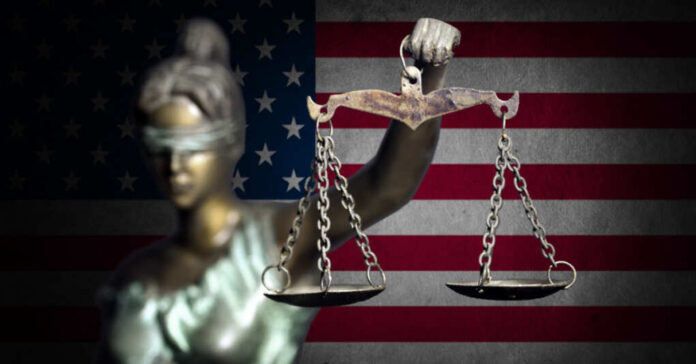The long-awaited Trump ballot ban case has made it to the Supreme Court, and so far, signs may be pointing to a victory for the GOP frontrunner. Even liberal justices are concerned about giving states too much power in national elections and about the case’s impact on democracy and future elections.
In mid-December of 2023, Colorado made headlines by banning former President Donald Trump from the Republican primary ballot, sparking controversy and inspiring Maine to pursue a similar course of action. The swirling debate among states centers on the 14th Amendment’s role in potentially keeping Trump from challenging Biden in 2024. This amendment, Section 3, prohibits individuals who have engaged in insurrection from holding office. Stemming from the Civil War era, the language was framed to prevent Confederate leaders from resuming power.
States are arguing that Trump can be removed from ballots under the 14th Amendment, Section 3, which bans an “officer of the United States” who took an oath “to support the Constitution of the United States” and subsequently “engaged in insurrection or rebellion against the same or given aid or comfort to the enemies thereof” from holding public office.
From the start, the Trump ballot ban was destined to be heard in the highest court in the land, and on February 8, SCOTUS began the proceedings to hear what could be one of its most controversial election-related cases. The last presidential election case the court heard was in 2000, when it was forced to halt an election recount in Florida and hand a victory to George W. Bush in the heated Bush v. Gore “hanging chad” case.
During the extensive two-hour argument, most of the justices seemed to agree that states lack authority in determining whether a presidential candidate can be disqualified from running under the 14th Amendment of the Constitution, which prohibits individuals who have “engaged in insurrection” from holding office. The justices expressed worries about potential inconsistencies among states in their rulings on candidate eligibility, with several suggesting that the enforcement of the provision in question rests solely with Congress.
From the first argument, it appeared that conservative and liberal justices were concerned that Colorado was setting a precedent to give states overwhelming and unconstitutional power to make significant decisions that impact national presidential elections.
Chief Justice John Roberts, who leans conservative, warned Jason Murray, a representative for the voters trying to keep Trump off the Colorado ballot, that if Colorado’s decision is upheld, other states might start disqualifying candidates from either party.
Discussions also delved into how states could enforce Section 3 against candidates, prompting debates about Congress’s role in legislating before state action. Even liberal Justice Elena Kagan questioned the rationale behind allowing a single state to determine the presidency, stressing the national implications of disqualifying a former president for “insurrection.”
The justices challenged Trump’s lawyer, Jonathan Mitchell, on his arguments regarding the enforcement of Section 3 by states without congressional legislation and the applicability of Section 3 to presidents. Mitchell argued that the amendment didn’t apply to Trump and that Congress should decide on seating “elected insurrectionists.” He also noted that January 6th was a riot, not an “insurrection.”
Chief Justice Roberts inquired whether a state’s elections official could disqualify a candidate who openly admitted to taking the insurrectionist oath mentioned in the provision. Mitchell responded that the secretary of state couldn’t take such action, suggesting that banning an admitted insurrectionist from the ballot would modify the Constitution’s office qualifications.
Mitchell emphasized that even if a candidate admitted to being an insurrectionist, Section 3 still permits them to run for office and potentially be elected. He indicated that it’s up to Congress, specifically the House or Senate, to decide whether to seat an elected insurrectionist, as each chamber has the authority to judge the qualifications of its members.
Even liberal justice Ketanji Jackson agreed, further indicating that she didn’t find evidence suggesting that the presidency was the primary focus of the framers when drafting Section 3 of the Constitution. Instead, she noted that their primary concern, as per historical records, revolved around the potential infiltration and embedding of insurrectionists into lower levels of the government, particularly state government structures.
Conservative Justice Brett Kavanaugh focused on the democratic impact of Section 3, expressing concern about potentially disenfranchising voters. Murray turned the tables and highlighted Trump’s actions as an attempt to disenfranchise millions who opposed him.
Although the court’s ruling remains uncertain, it appears that both liberal and conservative justices share some skepticism about the power of a single state to disqualify a candidate from the ballot. This skepticism could represent a much-needed silver lining for Trump amid a targeted Democrat-led effort to stop him from challenging President Joe Biden in a fair fight.

















